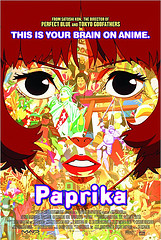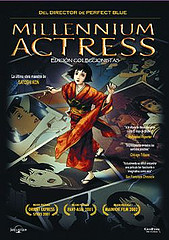Satoshi Kon's Millennium Actress & Paprika
I’ve yet to watch Tokyo Godfathers (its sitting on my desk right now) and I haven’t seen Perfect Blue in at least 5 years. But I’ve seen two movies by Satoshi Kon in the past month or so, and I couldn’t let pass the chance to think aloud about them.
The trailer for Paprika was so stunning that I had tickets for a weekend matinée almost immediately after it arrived at the Angelika. But even as I was easing into the dream-logic of the story, it was hard to ignore the steady rate of attrition around me; of the roughly 15 people who sat down for the previews, only 6 had made it past the first third of the movie.
Unlike the apparent majority of the audience at my screening, I enjoyed the slipstream nature of the narrative; most unexpected for me was how surprisingly well-interwoven it was. The preview, beautifully confusing and nearly without dialogue, hinted at a cryptic plot that I secretly hoped would leave me as confused as Mulholland Dr. I was unprepared for how conventional it ended up being and how effectively it used the the story to anchor the visuals (not unlike <a href="http://www.avclub.com/content/blog/my_year_of_flops_case_file_65the">_The Fountain</a>, another movie which on delivery ended up more banal than I had hoped).
->  <-
<-
In the end Paprika was a fun, quick, Saturday afternoon movie. In reading reviews of the movie afterwards, though, I came across references to Millennium Actress. I haven’t watched much anime in recent years, but I was surprised I hadn’t even heard of something so seemingly well-regarded. Without much knowledge of Millennium Actress _other than that it was apparently better than _Paprika, I rented it, and the conventional wisdom was right.
The similarities between the two movies are obvious from the start, both progressing as a series of vignettes with each scene sliding effortlessly and at random into the next. (As an aside, they also both feature a wonderfully sugary pop-trance score that cut in at the exact right moment when the plot approaches its climax.) But Paprika sacrifices any emotional core to follow a science-fiction plot that offers some semblance of logical progression and grounds the relationship between the dream-world and the real-world in, well, reality. Reality is a relative term here, though, since it assumes the existence of a <a href="http://www.technovelgy.com/ct/content.asp?Bnum=1363">fantastic dream machine</a>.
->  <-
<-
Millennium Actress delightfully forgoes a logically coherent scene progression in favor of a more visually coherent one as it dives headfirst through the looking glass. A man and a woman, both isolated from the real world and with lives tied to the rise of movies in Japan, relive thirty years of cinematic history and jump from samurai flick to WWII epic with such amusing abandon that its tough not to get sucked into their reenactments.
After seeing both movies, I think that my own thoughts mirror the thoughts of others. Paprika has some stunning scenes of dreams and fantasies melding together, but Millennium Actress does the same thing with more depth to the characters and a more satisfying arc to the plot.
